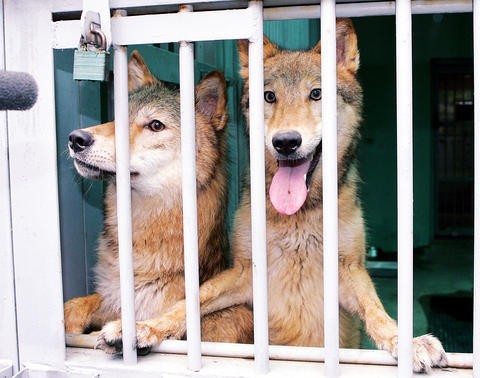South Korea's top university said yesterday its researchers' claims to have created the world's first cloned wolves are genuine, even though their paperwork was poor.
Seoul National University, still smarting from an earlier cloning scandal, had set up an inquiry after mistakes in an academic paper by the research team were pointed out.
The team, led by Seoul National University veterinary professors Lee Byung-chun and Shin Nam-shik, announced on March 26 it had cloned two female wolves named Snuwolf -- an acronym for Seoul National University wolf -- and Snuwolffy in October 2005.

PHOTO: AP
Lee was also a leading member of the team led by now-disgraced scientist Hwang Woo-suk that produced the world's first cloned dog in early 2005.
The paper on wolf cloning was found to contain incorrect details in a table analysing the mitochondrial DNA sequence of the wolves and their surrogate mother dogs.
The university secured blood and cell samples from three wolves -- the one that provided eggs and the two clones -- as well as from one of the two dogs which also provided eggs for the research.
"DNA analyses by two research institutions showed that the two wolves are clones," Kuk Young, head of the six-member inquiry panel, told journalists.
Kuk said the inaccurate details in the table and another error were "inadvertent mistakes" and not aimed at exaggerating the team's success.
But the panel found that the team did not write a laboratory note when they carried out the research in 2005.
"Materials and documents related to the sampling and analysing of samples were not kept well. It was also found that [the team] lacked the ability to systematically analyze [the research results]," the panel said in a statement.
It said the university would strengthen screening of research papers, focusing on "their academic value rather than news value," before going public with them.
Hwang was hailed as a national hero until a university inquiry ruled in 2005 that some of his work on cloning embryonic human stem cells was fake. He is now on trial.

Yemen’s separatist leader has vowed to keep working for an independent state in the country’s south, in his first social media post since he disappeared earlier this month after his group briefly seized swathes of territory. Aidarous al-Zubaidi’s United Arab Emirates (UAE)-backed Southern Transitional Council (STC) forces last month captured two Yemeni provinces in an offensive that was rolled back by Saudi strikes and Riyadh’s allied forces on the ground. Al-Zubaidi then disappeared after he failed to board a flight to Riyadh for talks earlier this month, with Saudi Arabia accusing him of fleeing to Abu Dhabi, while supporters insisted he was

‘SHOCK TACTIC’: The dismissal of Yang mirrors past cases such as Jang Song-thaek, Kim’s uncle, who was executed after being accused of plotting to overthrow his nephew North Korean leader Kim Jong-un has fired his vice premier, compared him to a goat and railed against “incompetent” officials, state media reported yesterday, in a rare and very public broadside against apparatchiks at the opening of a critical factory. Vice Premier Yang Sung-ho was sacked “on the spot,” the state-run Korean Central News Agency said, in a speech in which Kim attacked “irresponsible, rude and incompetent leading officials.” “Please, comrade vice premier, resign by yourself when you can do it on your own before it is too late,” Kim reportedly said. “He is ineligible for an important duty. Put simply, it was

The Chinese Embassy in Manila yesterday said it has filed a diplomatic protest against a Philippine Coast Guard spokesman over a social media post that included cartoonish images of Chinese President Xi Jinping (習近平). Philippine Coast Guard spokesman Jay Tarriela and an embassy official had been trading barbs since last week over issues concerning the disputed South China Sea. The crucial waterway, which Beijing claims historic rights to despite an international ruling that its assertion has no legal basis, has been the site of repeated clashes between Chinese and Philippine vessels. Tarriela’s Facebook post on Wednesday included a photo of him giving a

Syrian President Ahmed al-Sharaa on Sunday announced a deal with the chief of Kurdish-led forces that includes a ceasefire, after government troops advanced across Kurdish-held areas of the country’s north and east. Syrian Kurdish leader Mazloum Abdi said he had agreed to the deal to avoid a broader war. He made the decision after deadly clashes in the Syrian city of Raqa on Sunday between Kurdish-led forces and local fighters loyal to Damascus, and fighting this month between the Kurds and government forces. The agreement would also see the Kurdish administration and forces integrate into the state after months of stalled negotiations on